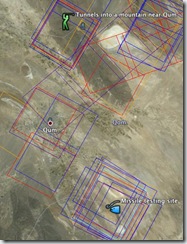A twine showed up in my in-box this morning that shows Iran’s secret nuclear plant near Qum on Google Earth. Twine is a pretty cool social news site that allows you to build a news reader network that uses both social and topical relevance to present news. I like the concept, because that is closer to how I make judgements. I may care about what a person thinks about technology, but really not care about their opinions on religion. I care about both topics, but have different trusted groups for them. 
The twine linked to a story titled “Ogle Earth: Hunting for Iran’s Secret Nuclear Power Plant near Qum on Google Earth”. I subscribe to a twine on data visualization, and have been active with Google Maps programming, so I followed the link.
Once the story was broken, it was pretty easy to change a setting on Google Maps to see which sites near Qum have been captured by satellites the most often and then compare pictures. My initial reaction was that the story was too transparent and that the writer was educating the Iranian government on how they could “see what we see”. I then thought some more, because I do not believe that ignorance makes a good foundation for real security either.
It reminded me of an incident from my hometown back in 1976. I grew up in Princeton Junction and attended some classes at Princeton University. As best as I can remember, there was a Princeton student named John Phillips who wrote a paper for physics class on how to build an atomic bomb. I never read his actual paper, but I can assure you that “the word on the street” was that it even went into details about how you could find fissionable material second hand. I remember us talking about “glow in the dark” watch hands and stuff like that.
I can also remember the 16 year old sense of righteous outrage that came along with the rumors that the FBI and CIA were trying to squash the whole thing. They wanted to confiscate the kid’s paper and prevent it from being published. Here was a kid that took publicly available research, then actually thought about what he was being taught, and got into trouble! I do not know whether the Feds really had anything to do with it or not. It prompted quite a dialog about the boundaries of intellectual freedom.
At the time, it seemed obvious to me that as a student that I had two choices. I could either be educated, or ignorant. You could study physics and understand how bombs work, or not. The idea of learning only some knowledge, but not too much, did not make any sense to me. How do you know what you aren’t supposed to know?
With regards to Iran and their nuclear facility, I have prayed and decided that education and knowledge is the path to security and peace of mind for all of us. Benjamin Franklin said that “Those who would give up Essential Liberty to purchase a little Temporary Safety, deserve neither Liberty nor Safety.” I think that the Iranian people, who by all accounts are well educated and intelligent need to understand just how the rest of the world is free to see what is going on inside their country. We need to fear less about what the Iranian government knows and care more about what the Iranian people should know.



Discussion
Comments are disallowed for this post.
Comments are closed.